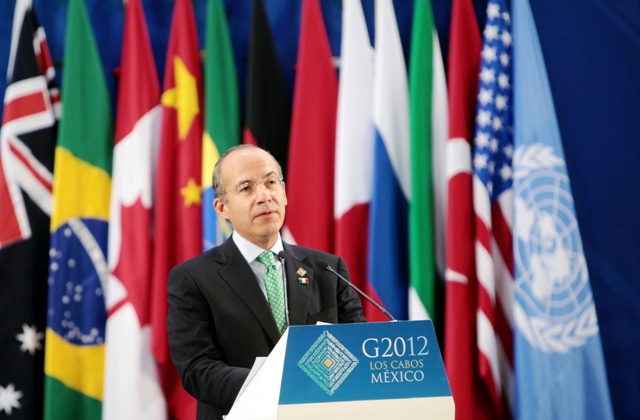Following efforts by members of civil society to protect one of Mexico’s most important coral reefs, political pressures obligated President Felipe Calderón to cancel the permit for the Spanish investment company Hansa to build a tourist development called “Cabo Cortés”.
At the meeting of the G20 from June 18 to 20 in Los Cabos, Baja California–just a few kilometers from Cabo Pulmo, where the development was planned–thousands of demonstrators protested against the project. Days earlier, on June 15, thousands marched to protest the development in Mexico City. These demonstrations focused world attention on the potential damage caused by the project at a time when international press was gathered in Mexico for the summit.
The risk that the protests could hurt the president’s image and have a negative effect on his party in the elections scheduled for July 1 was undoubtedly a factor in Calderón’s decision.
In announcing the “cancellation of the project” on June 15, Calderón pointed out that it was “the only coral reef in the Gulf of Mexico … an unequalled natural heritage of Mexico and one of the reefs with the greatest coral coverage in the world.”
He also noted the internationally recognized environmental significance of the area: in 1995, more than seventeen thousand acres of the Cabo Pulmo area were decreed a Natural Protected Area and National Marine Park; in 2005, UNESCO designated the area as a Natural World Heritage Site, and in 2008 it was included on the Ramsar Convention's list of Wetlands of International Importance.
Hansa Baja, the Mexican branch of the Spanish investment company Hansa, “began the application process for the construction of a giant tourist development called Cabo Cortés,” Calderon explained. “Owing to the ecological importance of Cabo Pulmo, the possibility that the resort in Cabo Cortés would be constructed caused unease among local communities, academics and environmental organizations.”
 Mexico’s President Felipe Calderón cancelled the permit for the Cabo Cortés mega development project just prior to presiding at the summit of leaders of the world’s top twenty most influential countries (G20). The summit was held nearby the reef threatened by the project. (Photo: courtesy of the President’s Office).
Mexico’s President Felipe Calderón cancelled the permit for the Cabo Cortés mega development project just prior to presiding at the summit of leaders of the world’s top twenty most influential countries (G20). The summit was held nearby the reef threatened by the project. (Photo: courtesy of the President’s Office).